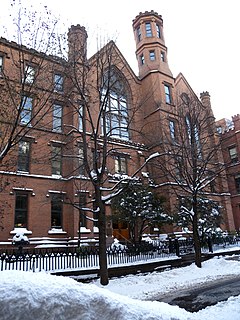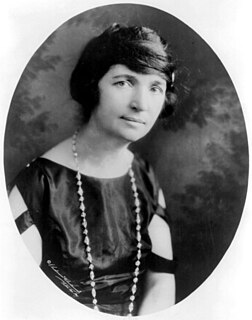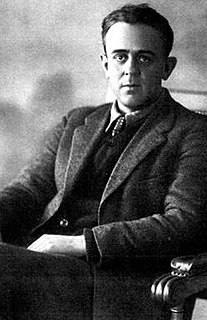
Barnard College is a private women's liberal arts college located in Manhattan, New York City. Founded in 1889 by Annie Nathan Meyer, who named it after Columbia University's 10th president, Frederick Barnard, it is one of the oldest women's colleges in the world. The acceptance rate of the Class of 2023 was 11.3%, the most selective and diverse class in the college's 129-year history.
Progressive education is a pedagogical movement that began in the late nineteenth century; it has persisted in various forms to the present. The term progressive was engaged to distinguish this education from the traditional Euro-American curricula of the 19th century, which was rooted in classical preparation for the university and strongly differentiated by social class. By contrast, progressive education finds its roots in present experience. Most progressive education programs have these qualities in common:

Virginia Crocheron Gildersleeve was an American academic, the long-time Dean of Barnard College, co-founder of the International Federation of University Women, and the sole female United States delegate to the April 1945 San Francisco United Nations Conference on International Organization, which negotiated the UN Charter and created the United Nations.

Arthurdale is an unincorporated community in Preston County, West Virginia, United States. Arthurdale was named for Richard Arthur, former owner of the land on which it was built, who had sold the land to the federal government under a tax default.
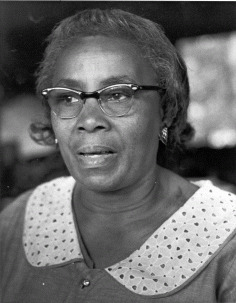
Septima Poinsette Clark was an American educator and civil rights activist. Clark developed the literacy and citizenship workshops that played an important role in the drive for voting rights and civil rights for African Americans in the Civil Rights Movement. Septima Clark's work was commonly under-appreciated by Southern male activists. She became known as the "Queen mother" or "Grandmother" of the Civil Rights Movement in the United States. Martin Luther King, Jr. commonly referred to Clark as "The Mother of the Movement". Clark's argument for her position in the Civil Rights Movement was one that claimed "knowledge could empower marginalized groups in ways that formal legal equality couldn't."
Judith R. Shapiro is a former President of Barnard College, a liberal arts college for women affiliated with Columbia University; as President of Barnard, she was also an academic dean within the university. She was also a professor of anthropology at Barnard. Shapiro became Barnard's 6th president in 1994 after a teaching career at Bryn Mawr College where she was Chair of the Department of Anthropology. After serving as Acting Dean of the Undergraduate College in 1985-6, she was Provost, the chief academic officer, from 1986 until 1994. Debora L. Spar was appointed to replace Shapiro, effective July 1, 2008.

Louise Michelle Rosenblatt was an American university professor. She is best known as a researcher into the teaching of literature.
William Heard Kilpatrick was an American pedagogue and a pupil, a colleague and a successor of John Dewey. He was a major figure in the progressive education movement of the early 20th century.

Dr Dame Rosemary Rue, DBE, FRCP, FFPHM, FRCPsych, FRCGP FRCS was a British physician and civil servant, most notable as the one-time regional general manager/medical officer of the Oxford Regional Health Authority.
Dr. Sarah Maxine Greene was an American educational philosopher, author, social activist, and teacher. Described upon her death as "perhaps the most iconic and influential living figure associated with [Columbia's] Teachers College," she was a pioneer for women in the field of philosophy of education, often being the sole woman presenter at educational philosophy conferences as well as being the first woman president of the Philosophy of Education Society in 1967. Additionally, she was the first woman to preside over the American Educational Research Association in 1984.

Edgar Fauver was an American athlete, coach, university administrator and medical doctor. He played football and baseball for Oberlin College in the 1890s. He later served as the athletic director at Wesleyan University from 1911 to 1937. He was also a pioneer in college athletics for women, coaching basketball and introducing baseball at Barnard College in the 1900s.
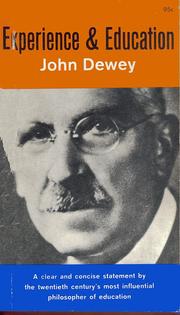
Experience and Education is a short book written in 1938 by John Dewey, a pre-eminent educational theorist of the 20th century. It provides a concise and powerful analysis of education. In this and his other writings on education, Dewey continually emphasizes experience, experiment, purposeful learning, freedom, and other concepts of progressive education. Dewey argues that the quality of an educational experience is critical and stresses the importance of the social and interactive processes of learning.
Richard Thomas Alexander (1887-1971) was an American educator and education theorist. An early proponent of the progressive education movement of John Dewey, Alexander was the driving force behind the creation of the New College, Teachers College, Columbia University, New York City. He was its chairman from 1932-1938. Alexander was described by his contemporaries as a hard-working, pragmatic man and a common sense academic with a genius for organization and a love of education.

Caroline Pratt was an American social thinker and progressive educational reformer whose ideas were influential in educational reform, policy, and practice.
Jessica Garretson Finch was an American educator, author, women's rights activist, founder of the Lennox School for girls, and founding president of Finch College.
Mary Tucker Thorp (1899–1974) was a teacher, educator and school principal at the Rhode Island College. She chaired the committee which investigated and made recommendations for accreditation standards for preschool education and which were adopted in the State Board of Education Codes in 1954. She was the first Distinguished Professor of Rhode Island College and both the first residence hall and a Professorship at the school are named in her honor. She was inducted into the Rhode Island Heritage Hall of Fame in 1969.
Inez Smith Reid was the Corporation Counsel for the District of Columbia and a judge of the District of Columbia Court of Appeals, the highest court for the District of Columbia.
Florence Eilau Bamberger was an American pedagogue, school supervisor, progressive education advocate, and author. Influenced by the ideas of John Dewey, she researched, lectured, and wrote extensively on the concept of child-centered education. She spent most of her career as a professor of education in the department of philosophy at Johns Hopkins University, and was the first woman to attain a full professorship at that university. From 1937 to 1947 she served as director of Johns Hopkins' College for Teachers. After her retirement, she taught in private elementary schools in Baltimore, Maryland.
Rosemary Park was a scholar, academic leader, advocate for women's education and the first American woman to become President of two colleges and Vice Chancellor of a major university. During her career Park served as the 5th President of Connecticut College from 1947–1962, the 6th President of Barnard College from 1962–1967 and the first female vice chancellor in the University of California system at UCLA from 1967 to 1970.





